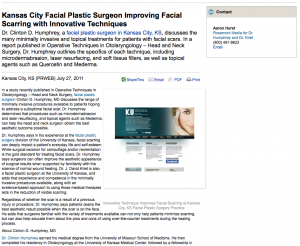 Dr. Clinton D. Humphrey, a facial plastic surgeon in Kansas City, KS, discusses the many minimally invasive and topical treatments for patients with facial scars. In a report published in Operative Techniques in Otolaryngology – Head and Neck Surgery, Dr. Humphrey outlines the specifics of each technique, including microdermabrasion, laser resurfacing, and soft tissue fillers, as well as topical agents such as Quercetin and Mederma.
Dr. Clinton D. Humphrey, a facial plastic surgeon in Kansas City, KS, discusses the many minimally invasive and topical treatments for patients with facial scars. In a report published in Operative Techniques in Otolaryngology – Head and Neck Surgery, Dr. Humphrey outlines the specifics of each technique, including microdermabrasion, laser resurfacing, and soft tissue fillers, as well as topical agents such as Quercetin and Mederma.
In a study recently published in Operative Techniques in Otolaryngology – Head and Neck Surgery, facial plastic surgeon Clinton D. Humphrey, MD discusses the range of minimally invasive procedures available to patients hoping to address a suboptimal facial scar. Dr. Humphrey determined that procedures such as microdermabrasion and laser resurfacing, and topical agents such as Mederma, can help the head and neck surgeon obtain the best aesthetic outcome possible.
Dr. Humphrey says in his experience at the facial plastic surgery division of the University of Kansas, facial scarring can deeply impact a patient’s everyday life and self-esteem. While surgical excision for camouflage and/or reorientation is the gold standard for treating facial scars, Dr. Humphrey says surgeons can often improve the aesthetic appearance of surgical results when supported by familiarity with the science of normal wound healing. Dr. J. David Kriet is also a facial plastic surgeon at the University of Kansas, and adds that experience and competence in the minimally invasive procedures available, along with an evidence-based approach to using those medical therapies aids in the reduction of visible scarring.
Regardless of whether the scar is a result of a previous injury or procedure, Dr. Humphrey says patients desire the best aesthetic result possible when the scar is on the face. He adds that surgeons familiar with the variety of treatments available can not only help patients minimize scarring, but can also help educate them about the pros and cons of using over-the-counter treatments during the healing process.
About Clinton D. Humphrey, MD
Dr. Clinton Humphrey earned his medical degree from the University of Missouri School of Medicine. He then completed his residency in Otolaryngology at the University of Kansas Medical Center, followed by a fellowship in Facial Plastic and Reconstructive Surgery at the University of Illinois-Chicago Medical Center. He is a member of the American Academy of Facial Plastic and Reconstructive Surgery, the American Academy of Otolaryngology, and the American Medical Association.
About J. David Kriet, MD, FACS
Dr. J. David Kriet earned his medical degree from the University of Oklahoma College of Medicine. He then completed an Otolaryngology residency at the University of Washington in Seattle, as well as a fellowship in facial plastic and reconstructive surgeons at the Oregon Health and Sciences University. Dr. Kriet is a Diplomat and Senior Examiner of the American Board of Facial Plastic Surgery, a Diplomat of the American Board of Otolaryngology, and a fellow of the American Academy of Facial Plastic and Reconstructive Surgery.
The University of Kansas Facial Plastic and Reconstructive Surgery practice has two locations: KU MedWest at 7405 Renner Rd. in Shawnee, KS 66217; and KU Medical Center at 3901 Rainbow Blvd. in Kansas City, KS 66160. Both can be reached at (913) 871-9785, or online at either www.kufacialplasticsurgery.com or the KU Facial Plastic Surgery Facebook Page.

Comments are closed.